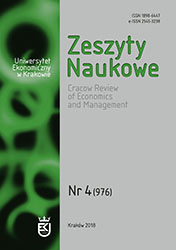Uwarunkowania lojalności klientów biur podróży
DOI:
https://doi.org/10.15678/ZNUEK.2018.0976.0405Słowa kluczowe:
lojalność behawioralna, biuro podróży, nieparametryczne metody analizy danych, metoda sztucznych sieci neuronowychAbstrakt
W artykule przedstawiono wyniki badań własnych, które pozwoliły na zidentyfikowanie kluczowych czynników warunkujących wystąpienie lojalności behawioralnej klientów biur podróży oraz opracowanie profilu lojalnego nabywcy usług biur podróży. Analizie poddano rzeczywiste dane historyczne, pochodzące z systemu księgowo-rezerwacyjnego jednej z ogólnopolskich sieci franczyzowych konsolidującej 60 biur agencyjnych, dotyczące 15 248 rezerwacji dokonanych w latach 2013–2017 przez nabywców imprez turystycznych. W badaniu zależności zastosowano nieparametryczną metodę sztucznych sieci neuronowych, a najważniejszymi determinantami lojalności behawioralnej okazały się zmienne: czas trwania imprezy turystycznej, liczba dzieci poniżej 14. roku życia ujętych w rezerwacji oraz cena i miejsce docelowe imprezy turystycznej.Downloads
Bibliografia
Albayrak T., Caber M. (2008), Tourists’ Satisfaction and Its Interaction with Loyalty towards to a Destination, Salamanca University, Salamanca.
Back K. (2001), The Effects of Image Congruence on Customer Satisfaction and Brand Loyalty in the Lodging Industry, The Pennsylvania State University, Pennsylvania.
Bowen J.T., Chen S. (2001), The Relationship between Customer Loyalty and Customer Satisfaction, „International Journal of Contemporary Hospitality Management”, vol. 13, nr 5, https://doi.org/10.1108/09596110110395893.
Correia Loureiro S.M., Kastenholz E. (2011), Corporate Reputation, Satisfaction, Delight, and Loyalty towards Rural Lodging Units in Portugal, „International Journal of Hospitality Management”, vol. 30, nr 3, https://doi.org/10.1016/j.ijhm.2010.10.007.
Eid R. (2013), Integrating Muslim Customer Perceived Value, Satisfaction, Loyalty and Retention in the Tourism Industry: An Empirical Study, „International Journal of Tourism Research”, vol. 17, nr 3, https://doi.org/10.1002/jtr.1982.
Gatnar E. (2001), Nieparametryczna metoda dyskryminacji i regresji, Wydawnictwo Naukowe PWN, Warszawa.
Hair J.F., Black W.C. Jr., Babin B.J., Anderson R.E. (2010), Multivariate Data Analysis, wyd. 7, Pearson Prentice Hall, Upper Saddle River.
Haque A., Khan A.H. (2013), Factors Influencing of Tourist Loyalty: A Study on Tourist Destinations in Malaysia, Proceedings of Third Asia-Pacific Business Research Conference 25–26 February 2013, Kuala Lumpur, Malaysia.
Hernández-Lobato L., Solis-Radilla M.M., Moliner-Tena M.A., Sánchez-García J. (2006), Tourism Destination Image, Satisfaction and Loyalty: A Study in Ixtapa-Zihuatanejo, Mexico, „Tourism Geographies: An International Journal of Tourism Space, Place and Environment”, vol. 8, nr 4, https://doi.org/10.1080/14616680600922039.
Hill N., Alexander J. (2003), Pomiar satysfakcji i lojalności klientów, Oficyna Ekonomiczna, Kraków.
Jani D., Han H. (2013), Personality, Satisfaction, Image, Ambience, and Loyalty: Testing Their Relationships in the Hotel Industry, „International Journal of Hospitality Management”, vol. 37, https://doi.org/10.1016/j.ijhm.2013.10.007.
Kim W., Han H. (2008), Determinants of Restaurant Customers’ Loyalty Intentions: A Mediating Effect of Relationship Quality, „Journal of Quality Assurance in Hospitality & Tourism”, vol. 9, nr 3, https://doi.org/10.1080/15280080802412727.
Lai W.H., Vinh N.Q. (2013), Online Promotion and Its Influence on Destination Awareness and Loyalty in the Tourism Industry, „Advances in Management & Applied Economics”, vol. 3, nr 3.
Lula P., Paliwoda-Pękosz G., Tadeusiewicz R. (2007), Metody sztucznej inteligencji i ich zastosowania w ekonomii i zarządzaniu, Wydawnictwo Akademii Ekonomicznej w Krakowie, Kraków.
Mechinda P., Serirat S., Gulid N. (2009), An Examination of Tourists’ Attitudinal and Behavioral Loyalty: Comparison between Domestic and International Tourists, „Journal of Vacation Marketing”, vol. 15, nr 2, https://doi.org/10.1177/1356766708100820.
Michalska-Dudek I. (2017), Kształtowanie lojalności klientów biur podróży, Wydawnictwo Uniwersytetu Ekonomicznego we Wrocławiu, Wrocław.
Movafegh A., Movafegh A. (2013), The Impact of Service Quality on Tourist Loyalty in Malaysian Tourism Industry, „International Journal of Innovative Ideas”, vol. 13, nr 1.
Oliver R.L. (1999), Whence Consumer Loyalty? „Journal of Marketing”, vol. 63, nr 4, https://doi.org/10.2307/1252099.
Pong L.T., Yee P.T. (2001), An Integrated Model of Service Loyalty, Academy of Business & Administrative Sciences International Conferences, Brussels.
Prayag G., Ryan C. (2012), Antecedents of Tourists’ Loyalty to Mauritius: The Role and Influence of Destination Image, Place Attachment, Personal Involvement, and Satisfaction, „Journal of Travel Research”, vol. 51, nr 3, https://doi.org/10.1177/0047287511410321.
Pritchard M.P., Howard D.R. (1997), The Loyal Traveler: Examining a Typology of Service Patronage, „Journal of Travel Research”, vol. 35, nr 4, https://doi.org/10.1177/ 004728759703500401.
Reichheld F.F., Sasser Jr. W.E. (1990), Zero Defections. Quality Comes to Service, „Harvard Business Review”, nr 9–10.
Seweryn R. (2012), Kreowanie wartości dla klienta przez obszar recepcji turystycznej, Zeszyty Naukowe. Seria specjalna: Monografie, nr 220, Wydawnictwo Uniwersytetu Ekonomicznego w Krakowie, Kraków.
Wskaźniki marketingowe (2004), red. R. Kozielski, Oficyna Ekonomiczna, Kraków.
Yoon Y., Uysal M. (2005), An Examination of the Effects of Motivation and Satisfaction on Destination Loyalty: A Structural Model, „Tourism Management”, vol. 26, nr 1, https://doi.org/10.1016/j.tourman.2003.08.016.
Zong H., Fu X., Cai L.A., Lu L. (2014), Destination Image and Tourist Loyalty: A Meta-analysis, „Tourism Management”, vol. 40.




